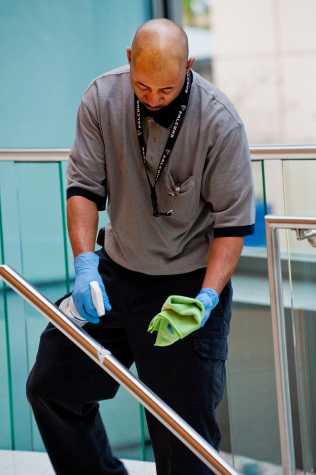Event Organizers and Staff
Flu Prevention at Mass Gatherings
Flu can spread easily at events and mass gatherings, such as concerts, festivals, conferences, worship services, and sporting events. People traveling to and from your event can also spread flu to other communities and to family members when they get home.
Getting a flu vaccine every year is the best way to avoid getting seasonal flu. Besides the flu vaccine, there are other important actions you and your community can take to protect yourself and others from getting and spreading the flu. These are called nonpharmaceutical interventions or NPIs. Examples of NPIs include staying home when you are sick and covering your coughs and sneezes. NPIs are especially important during pandemic flu outbreaks, when people have little or no immunity to a new flu virus and a vaccine is not yet available.
- What you can do personally (Personal NPIs): Stay home when you are sick. Cover your coughs and sneezes. Wash your hands often.
- What communities can do (Community NPIs): Implement social distancing interventions in schools, workplaces, and at events.
- What everyone can do to keep the environment germ-free (Environmental NPIs): Clean frequently touched surfaces and objects like door knobs.
- CDC provides educational resources and training on how to incorporate personal, community, and environmental NPIs into your pandemic flu plans.
The actions you take and the plans you make today make a difference. Here are some important steps for protecting yourself, your staff, and event attendees from getting and spreading the flu.
1. Building flu prevention into your event planning and organization.

- Connect with your local public health department to review or develop your pandemic flu plan for your event or gathering.
- Develop an emergency communication plan for sharing information with staff and attendees during a flu pandemic.
- Share the pandemic flu and emergency communication plans with staff.
- Establish flexible attendance and sick leave policies for staff.
- Develop a system to alert the local health department about large increases in absenteeism due to flu-like symptoms.
- Identify ways to reach staff and attendees if events are canceled (for example, web-based broadcasts, email, television, or radio).
- Identify strategies to increase space or limit contact between attendees during a flu pandemic (for example, staggering event schedules).
- Plan ways to care for attendees and staff who get sick during an event and to separate them from attendees and staff who are well.
2. Being prepared and informed.

- Identify public health contacts in your area such as state, tribal, local, and territorial public health officials.
- Stay informed about your local flu situation through communication with your established public health contacts.
- Consider providing the seasonal flu vaccine to event staff when it is available.
* During a flu pandemic *
- Make plans for what to do if your local public health department recommends closing schools or canceling events.
- Consider providing the pandemic flu vaccine to event staff as soon as it becomes available in your area.
Why is this important?
Knowing what precautions to take and where to go to get credible information will help you make plans for protecting event staff and attendees.
3. Communicating with event staff about flu prevention.

Use staff training and routine workplace communications, such as email, to
- Encourage staff to get a seasonal flu vaccination as soon as it is available in your area.
- Encourage staff to take everyday preventive actions, such as staying home when they are sick, covering their coughs and sneezes with a tissue, and washing their hands often.
- Encourage staff to clean frequently touched surfaces and objects.
- Inform staff about sick leave policies.
* During a flu pandemic *
- Discourage staff and attendees from gathering in other places if the event or gathering is canceled.
- If people must gather, it is best to keep them in small groups of less than 6 people. Try to make sure groups consist of the same staff or attendees each day.
- Implement refund policies to encourage people to stay home if they become sick.
- Encourage staff to get a pandemic flu vaccination as soon as it is available in your area.
- Designate a separate room and transportation for sick attendees and staff, if necessary.
Provide additional staff training that includes
- Cross-training staff to ensure coverage in case people need to stay home when sick.
- Separating sick people from healthy people, and sending sick people home as soon as possible.
4. Telling attendees about flu prevention.

Tell attendees about flu prevention through the event’s promotional materials, website, event signage, and live announcements.
Encourage attendees to
- Get a seasonal flu vaccination as soon as it is available in your area.
- Take everyday preventive actions, such as staying home when they are sick, staying home if exposed to someone else who is sick, covering coughs and sneezes with a tissue, and washing their hands or using hand sanitizer.
- Avoid attending the event if they are sick or are at high risk for flu complications.
* During a flu pandemic *
Encourage attendees to
- Cover their nose and mouth with a mask or cloth if they are around sick people during the event.
- Get a pandemic flu vaccination as soon as it is available in your area.
Prepare additional information for attendees that will encourage sick people to keep their distance from well people. Consider
- Posting your refund policy on your website.
- Encouraging attendees to stay home if they’re sick.
- Finding ways for people to participate in your event virtually, if possible, to keep sick people at home.
- Making regular announcements during the event about plans for separating sick and healthy people.
5. Maintaining a clean environment and providing staff with supplies that prevent the spread of flu.

What to do:
Staff should clean surfaces and objects that are frequently touched, including doorknobs, railings, and countertops.
Does cleaning with soap and water kill the flu virus?
- Yes, soap and water are all you need to remove the flu virus.
- You can also use a bleach-and-water solution or disinfectant with a label that says “EPA approved” for killing viruses and bacteria. Always follow directions on product labels.
Why is this important?
The flu virus can remain on surfaces for up to 48 hours. Cleaning frequently touched surfaces and objects lowers the amount of flu virus that can be spread by touching an infected surface and then touching your eyes, nose, or mouth.
- Page last reviewed: August 2, 2017
- Page last updated: August 2, 2017
- Content source:


 ShareCompartir
ShareCompartir